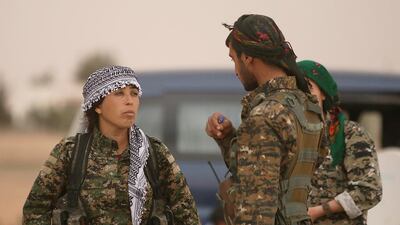NEAR TABQA DAM, Syria // An offensive to capture the Syrian city of Raqqa from ISIL will last several months, the operation’s commander said, a longer time frame than previously signalled by the Kurdish YPG militia that is at the heart of the campaign.
Commander Rojda Felat, a member of the YPG, also indicated the start date for the final assault on Raqqa may slip slightly from a previously declared target of early April.
“In general the attack on the city will start in April, if not at the start of the month then in the middle of it,” she said, speaking near the Tabqa dam about 40 kilometres west of Raqqa.
The dam and the nearby town of Tabqa are a major focus of the Euphrates Wrath campaign by the US-backed Syrian Democratic Forces (SDF) that groups the YPG and allied Arab militia fighters.
The taking of Raqqa itself will take “a number of months”, Cmdr Felat said, “because it requires us to completely control Tabqa firstly, and to organise the campaign plans very well, and to get civilians out of the city.”
SDF forces captured the northern entrance to the Tabqa dam last week, but have not advanced further since then. Engineers were brought to the site earlier this week to open damaged spillways to relieve built-up water pressure.
Cmdr Felat, one of around 1,000 women taking part in the Raqqa campaign, said the extremists had threatened to blow up the dam if the SDF did not halt their assault.
She said SDF operations to seize the dam had been complicated by ISIL booby traps and threats to destroy it, and alternative plans had been drawn up to take it. She said it should be captured within days.
“There were fears of the dam’s destruction because our fighters found a large number of mines, so our forces withdrew from the body of the dam to safeguard its integrity.”
The SDF captured the Tabqa airbase from ISIL last week after carrying out an airborne landing with the US-led coalition in an area on the southern banks of the Euphrates River – the first SDF operation of its kind.
The SDF has been waging a multi-phased offensive since November to isolate Raqqa, ISIL’s main urban base in Syria, with backing from the US-led coalition against the extremist group. The coalition has yet to say when or how the final assault on Raqqa will begin even as the SDF edge closer to the city.
“Regarding the coalition, they are providing air and ground support in this campaign, and the help is better than in the previous occasions, offering weapons that we did not have before,” Cmdr Felat said.
“They are offering support such as using heavy and medium weapons, anti-armour weapons and artillery. They are positioned behind our front line forces, 2 or 3km away,” she said.
“There is also a joint intelligence operations room between us and the coalition where we exchange information and coordinate together concerning the operation to liberate Raqqa.”
Cmdr Felat said ISIL had used far fewer suicide bombers and car bombs in the latest battles, a sign of its weakened state.
The escalating assault on Raqqa overlaps with a US-backed campaign to drive ISIL from the Iraqi city of Mosul. The twin assaults threaten to deal two major blows to extremist group and its self-declared “caliphate” in Iraq and Syria.
The SDF has been advancing on Raqqa city from the north, east and west. The city is bordered to the south by the Euphrates River.
The Syrian Observatory for Human Rights, a UK-based organisation that reports on the war, believes around 200,000 people are living in Raqqa.
Cmdr Felat, who lost 20 family members in an ISIL suicide attack at a wedding last year, was a student of literature before the Syrian conflict began in 2011. She had always dreamed of going to military college, and joined the YPG, or the People’s Protection Units, once it was formed.
“I joined the YPG out of desire as a woman to defend my people and to defend my existence as a woman,” she said.
* Reuters

